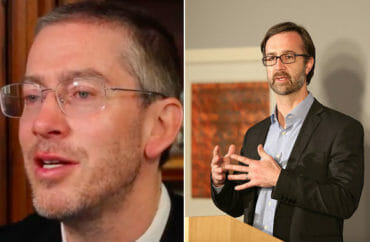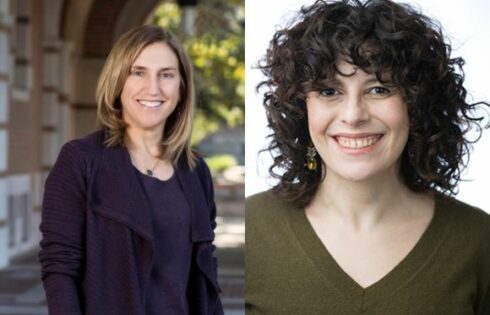
Is he making ‘the case against exercise’?
WASHINGTON, DC – Public education is great if you love conventional learning and you have inspiring teachers.
That’s not most kids or most teachers, and America’s obsession with teaching children things they’ll never use in the workforce is actively setting back their careers and happiness, according to a contrarian economist whose new book is riling the academy.
George Mason University’s Bryan Caplan made his case to the libertarian Cato Institute last week that, aside from “literacy and numeracy” skills, children are better than adults at deciding what they should learn in order to pursue a fulfilling career.
New America’s Kevin Carey rebutted Caplan’s argument – which he dubbed “libertarianism for kindergartners” – by saying it runs against the history of successful modern countries.
It’s akin to making “the case against exercise,” said Carey, director of education policy for the think tank, referring to Caplan’s new book The Case Against Education.
Which is more valuable, ‘guerrilla education’ or a degree?
Assailing everything from higher-level mathematics to Latin, Caplan argued that employers use graduation to separate the wheat from the chaff – nothing more.
“You could be one Aristotle-related class short of graduation” and it will prevent you from getting a job, because a person’s willingness to slog through even useless classes signals they are better workers, he said. It also shows “conformity,” a prized trait among employers.
Caplan claimed high school students spend more time learning social studies than English or math. “Something seemed wrong from an early age for me,” seeing how much traditional education was valued: The U.S. is near the top of global rankings for the premium paid for educated workers.
But this surplus of education is belied by the paucity of people who attend classes without paying for them, he argued, giving the hypothetical example of sitting in on Princeton classes.
MORE: Is college really for everyone?
Professors are often “touched” if you ask to attend their classes without matriculating, but “at the end of four years of guerrilla education,” would you rather have the Princeton education or the degree? he asked rhetorically.
Negative aspects of modern education also signal that education itself is not the point: Students immediately forget what they learn in cramming, and “cheating is totally pointless” unless the desired result is a credential.
This explains why students love easy professors, Caplan argued: The would-be employer judges the applicant by the grade, not the actual work involved.
‘Education is really a kind of redistribution’
Caplan is also contemptuous of “the humanist critique” of his argument – the idea that education will “greatly enhance” a person’s appreciation for ideas and culture. He asked the audience to watch an “average teacher” on YouTube for an hour: “They’re not inspiring.”
And contrary to conservative critiques, education only “modestly” changes students’ political views, Caplan claimed.
Putting aside the selection bias of who chooses college in the first place, those who emerge tend to be “markedly” more socially liberal and economically conservative than the rest of America, which only half-resembles the stereotypical professor. “If it’s brainwashing, it’s highly ineffective brainwashing.”
The core problem is that “education is really a kind of redistribution” that arbitrarily sets back those who don’t participate in the credential race. This is why the given job today requires three more years of education than is actually needed to do it, he said.
MORE: Caplan calls college ‘a toenail-fungus cream that doesn’t work’
The same problem exists in fields where certifications are the credential of choice, such as information technology, according to Caplan. Many programmers in the 1970s were self-taught, a path that barely exists anymore: “You have to be way better [in skills] to get in through these backdoor routes” without needless credentials.
The best response to this challenge is “educational austerity”: Cutting requirements is relatively easy to enact and it benefits “all the people who are suffering” at the bottom of the arbitrary education ladder, he said.
Objectively measuring results from education reform, in contrast, is a hard slog with little payoff. If your paid gardener hasn’t measurably improved your garden, and then promises to do it better when you threaten to stop paying him, would you do it? Caplan asked.
The “social payoff” is better for both students and taxpayers if children are given earlier opportunities to explore vocational education, which is common in Germany and Switzerland, particularly “for kids who don’t like school, which is a lot of them,” Caplan said.
‘You can’t brain-scan infants’ into a vocation
Caplan’s view is “remarkably cramped and impoverished” when considering education is the core component of citizenship, Carey argued: You can’t be a “fully realized person” without knowing history.
Carey said he’s also critical of how the educational system works, particularly the “mythology” around college education, but those of Caplan’s persuasion don’t appreciate that mass education for an entire society is historically atypical and a “very ambitious aspiration.”
Arguments about the uselessness of most subjects to a job are “just a natural consequence of specialization” as people grow up, Carey said: “You can’t brain-scan infants” to decide what job they will take as adults.
It’s not particularly insightful to note that people forget things when they stop studying them, Carey said: “That’s just a description of how human cognition works.” And for “the people who have the least” – racial minorities and first-generation students – a formal education is their ticket to a successful life, he said. “They don’t get it from the non-educational part of their lives.”
MORE: Most college learning is irrelevant to jobs
Contrary to Caplan’s signaling argument, which comes from economics, the objective benefits of an education can be proven, according to the non-economist Carey. He pointed to a study of educated and non-educated farmers that found the former were better at farming.
Schooling of any kind gave them “the ability to deal with disequilibria” in farming, Carey said. Regardless of the form of educational system in various countries, there’s a strong decades-long relationship between education levels and productivity.
“Every single one of them did it by large public investments in education,” he said.
Stop indulging ‘the Einstein hypothetical’
Carey is overstating his case when he credits education with life improvements, Caplan rebutted. Pointing to better outcomes when people immigrate to countries with robust educational systems, the economist said nutrition and sanitation could also explain it.
A person who leaves a poor country for Sweden will do better regardless of education, Caplan claimed.
The other problem with the reform scenario is how much can be fixed now and isn’t, he said. Everyone knows that “immersion” is the only way to competently learn a foreign language, and it’s a pedagogical rarity.
“If there’s something that obvious … and yet they’re not doing it, it suggests there’s something very messed up about the system,” he said. Meanwhile, people who don’t take years of useless history classes carry a “stigma” relative to their peers who did and promptly forgot it.
MORE: Women’s studies should be a ‘virus’ that infects other fields
Contrary to Carey’s argument about minorities, the college-bound default in the education system is likely harming more students than it helps, Caplan argued.
Upper-middle-class households have a bias against vocational training that leads their children to slog through college, tune out a “windbag” professor and eventually drop out. That scenario is “way more likely than the Einstein hypothetical” that traditional education unlocks the potential of marginalized children, Caplan claimed.
It shouldn’t be an either-or, Carey responded: Forcing students into an “irrevocable choice” between vocational and traditional school will shut out the former from the “managerial classes.” The better option is to let students practice specialization earlier in their education, such as in community college.
‘Parents don’t listen’
The core argument between Caplan and Carey boils down to who should choose the education path, grownups or children.
Caplan reiterated that there’s a “large silent group of kids who hate” forced participation in music and sports. The claimed benefits associated with them, such as discipline, are better compared to “staying home and playing video games,” he agreed, but that’s not saying much.
Plus, pushing sports “fill[s] many kids heads with unrealistic ambitions” and wastes their time, he said.
Carey was visibly exasperated at Caplan’s faith in children’s interests. If Carey’s daughter got to choose what she wanted, “she’d spend three hours a day reading books about fairy princesses,” he said. “Guided learning” is the most important role of parents, and Caplan embraces the ideas of “left-wing idealistic” people.
Caplan embraced the comparison. “I would trust the kid. Kids know what they like … but parents don’t listen.”
MORE: How the government makes education more expensive for no reason
Like The College Fix on Facebook / Follow us on Twitter





Please join the conversation about our stories on Facebook, Twitter, Instagram, Reddit, MeWe, Rumble, Gab, Minds and Gettr.